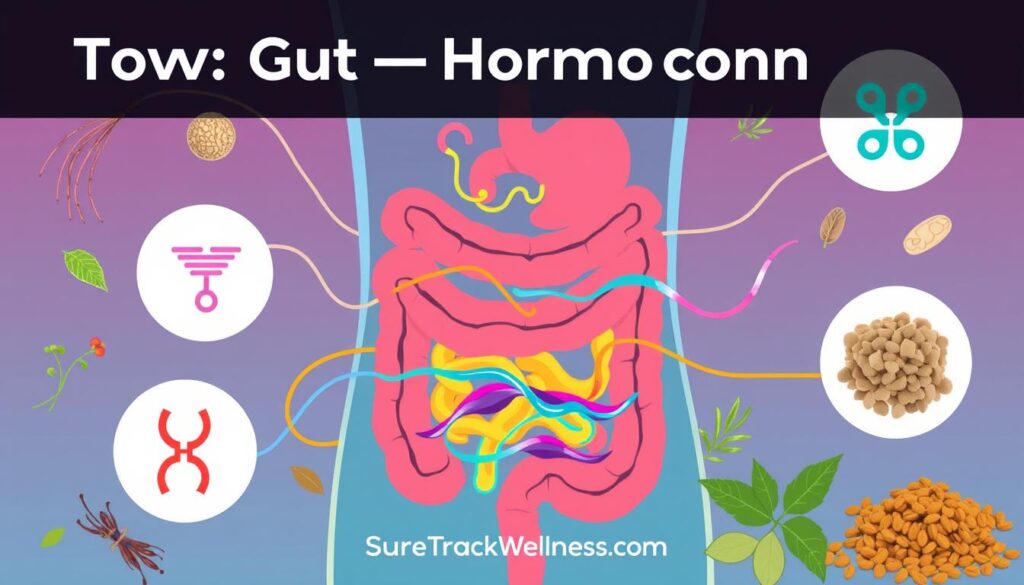In today’s fast-paced world, hormone imbalances have become increasingly common, leading to a wide range of health issues. However, there is a growing recognition that a holistic approach can be highly effective in restoring hormonal equilibrium and promoting overall well-being. This article explores the power of natural, comprehensive strategies to regain your health naturally, empowering you to take control of your hormone health through holistic wellness practices.
Key Takeaways
- Understand the role of hormones in your overall health and the common symptoms of imbalance.
- Discover the benefits of a natural hormone balance through a holistic approach.
- Explore various natural therapies, including dietary changes, herbal supplements, and mind-body practices.
- Recognize the importance of sleep, gut health, and regular exercise in maintaining regain your health naturally.
- Learn how to work with healthcare practitioners and track your progress on your journey to hormonal well-being.
Understanding Hormone Imbalance
Hormones are chemical messengers that play a vital role in regulating various bodily functions, from metabolism and growth to mood and reproductive health. When these delicate hormonal systems become imbalanced, it can lead to a range of disruptive symptoms that can significantly impact our overall well-being.
What Are Hormones?
Hormones are produced by the endocrine system, a network of glands, including the thyroid, adrenal, and reproductive organs. These hormones travel through the bloodstream, delivering crucial instructions to different parts of the body, ensuring everything functions seamlessly. Any disruption in the production or regulation of these hormones can lead to an imbalance, triggering a cascade of physiological and emotional changes.
Common Symptoms of Hormone Imbalance
The symptoms of hormone imbalance can be wide-ranging and vary depending on the specific hormone affected. Some of the most common signs include:
- Fatigue and lack of energy
- Unexplained weight changes, either gain or loss
- Mood swings, irritability, or depression
- Irregular menstrual cycles or menopausal symptoms
- Difficulty sleeping or insomnia
- Decreased libido or sexual dysfunction
- Hair loss or excessive facial or body hair growth
Causes of Hormone Imbalance
The causes of hormone imbalance can be multifaceted, ranging from underlying medical conditions to lifestyle factors. Some of the leading contributors to hormonal imbalances include:
- Stress: Chronic stress can disrupt the delicate balance of the endocrine system, leading to imbalances in cortisol, adrenaline, and other key hormones.
- Poor diet: A diet high in processed foods, refined carbohydrates, and unhealthy fats can negatively impact hormone regulation.
- Environmental toxins: Exposure to endocrine-disrupting chemicals found in personal care products, household cleaners, and certain plastics can interfere with normal hormone function.
- Aging: Natural changes in hormone production as we grow older can lead to imbalances, particularly for women during the menopausal transition.
- Underlying medical conditions: Conditions like polycystic ovarian syndrome (PCOS), thyroid disorders, and insulin resistance can all disrupt the endocrine system.
Understanding the complexities of hormone imbalance is the first step towards regaining optimal endocrine system health and addressing the root causes through a holistic approach, rather than relying solely on hormone replacement therapy.
The Importance of Holistic Care
In the world of integrative medicine, holistic wellness has emerged as a transformative approach to addressing hormone imbalances. Unlike traditional treatments that focus solely on symptoms, holistic care recognizes the complex interplay between the physical, emotional, and environmental factors that influence our hormonal well-being.
Definition of Holistic Care
Holistic care is a comprehensive, patient-centered model that views the individual as a whole, rather than a collection of separate parts. This approach emphasizes the importance of addressing the root causes of health concerns, rather than simply managing the symptoms.
Benefits of a Holistic Approach
- Addresses the underlying causes of hormone imbalances, promoting long-term, sustainable health.
- Considers the interconnectedness of the body, mind, and environment, providing a more personalized and effective treatment plan.
- Empowers individuals to take an active role in their own health and wellness, fostering a deeper understanding of the factors that contribute to hormonal balance.
- Incorporates a wide range of therapies, from dietary changes and herbal supplements to mindfulness practices and stress reduction techniques, to create a customized plan that meets the unique needs of each person.
By embracing the principles of holistic wellness, individuals can reclaim their hormonal health and experience the profound benefits of integrative medicine.

“Holistic care is not just about treating the symptoms, it’s about addressing the whole person and the underlying factors that contribute to their health.”
Natural Therapies for Hormone Balance
Achieving natural hormone balance is essential for overall well-being, and there are several holistic approaches that can help. From dietary changes to herbal supplements and stress reduction techniques, these natural therapies can support the body’s endocrine system and promote hormonal harmony.
Dietary Changes to Consider
Making mindful adjustments to your diet can have a profound impact on hormone levels. Incorporating more whole, nutrient-dense foods can help nourish the body and support natural hormone balance. Consider increasing your intake of healthy fats, high-quality protein, and fiber-rich vegetables. Avoiding processed foods, refined carbohydrates, and excessive sugar can also be beneficial.
Herbal Supplements and Their Benefits
Certain herbal supplements have been shown to positively influence hormone regulation. Adaptogens like ashwagandha and rhodiola can help the body adapt to stress and support adrenal function, which is crucial for adrenal fatigue treatment. Omega-3 fatty acids, such as those found in fish oil, can also contribute to natural hormone balance.
Mindfulness and Stress Reduction Techniques
- Regular meditation and deep breathing exercises can help lower stress hormones and promote a sense of calm, which is essential for maintaining natural hormone balance.
- Engaging in gentle yoga or other mindful movement practices can also be beneficial for managing stress and supporting hormonal health.
By incorporating these natural therapies into your lifestyle, you can take proactive steps towards restoring hormonal harmony and achieving optimal well-being.
The Role of Nutrition in Hormone Health
Maintaining a balanced diet is crucial for regaining your health naturally and managing thyroid disorders effectively. Proper nutrition plays a vital role in supporting hormone production and ensuring hormonal equilibrium within the body.
Key Nutrients for Balanced Hormones
Certain essential nutrients are known to support hormone health. These include:
- Omega-3 fatty acids, which can help reduce inflammation and support overall hormone function.
- Vitamin D, which is crucial for the regulation of hormones like estrogen, progesterone, and testosterone.
- Zinc, which is involved in the production of hormones like insulin and thyroid hormones.
- Magnesium, which helps regulate the stress hormone cortisol and supports the thyroid gland.
Foods to Avoid
While incorporating nutrient-rich foods is important, it’s equally crucial to be mindful of certain foods that can disrupt hormonal balance. These include:
- Processed and fried foods, which can contribute to inflammation and hormone imbalances.
- Refined carbohydrates, such as white bread, pastries, and sugary drinks, which can spike blood sugar and affect insulin levels.
- Excessive caffeine and alcohol, which can stress the adrenal glands and disrupt the body’s hormone production.
By focusing on a balanced, whole-food-based diet and limiting the consumption of hormone-disrupting foods, you can take a significant step towards regaining your health naturally and managing thyroid disorders effectively.
The Power of Regular Exercise
When it comes to holistic wellness and natural hormone balance, regular physical activity plays a crucial role. Exercise has been shown to have a profound impact on the body’s hormonal system, helping to restore balance and promote overall health.
Exercise Types That Promote Balance
To achieve optimal hormonal regulation, a variety of exercise modalities can be beneficial. Some of the most effective types include:
- Strength training: Resistance exercises, such as weightlifting, can help to increase the production of testosterone and growth hormone, both of which are essential for maintaining a healthy hormonal balance.
- High-intensity interval training (HIIT): HIIT workouts, which involve short bursts of intense activity followed by periods of rest, have been linked to improved insulin sensitivity and the regulation of stress hormones like cortisol.
- Yoga and Pilates: These mind-body practices not only promote relaxation and stress reduction but also help to improve flexibility, posture, and muscular endurance, all of which can contribute to a more balanced hormonal profile.
Creating a Sustainable Routine
Establishing a consistent and sustainable exercise routine is key to maximizing the benefits for hormone health. Here are some tips to help you create a routine that works for you:
- Start with a realistic commitment: Aim for 30-60 minutes of exercise most days of the week, and gradually increase the duration and intensity as you become more comfortable.
- Incorporate variety: Mix up your exercise routine to target different muscle groups and avoid boredom or plateaus.
- Listen to your body: Pay attention to how your body responds to different types of exercise and adjust your routine accordingly.
- Schedule it in: Make exercise a non-negotiable part of your daily or weekly schedule, just like any other important appointment.
By embracing the power of regular exercise and incorporating it into your holistic wellness plan, you can take a significant step towards achieving natural hormone balance and optimal health.

Integrating Mind-Body Practices
In the realm of holistic wellness and integrative medicine, the power of mind-body practices cannot be overstated. These ancient techniques have the potential to profoundly impact our hormonal health, restoring balance and harmony within the body. Let’s explore the benefits of yoga and meditation, and how you can incorporate these powerful practices into your daily life.
Yoga and Its Benefits
Yoga, a centuries-old practice, offers a holistic approach to well-being, integrating physical postures, breathwork, and mindfulness. Regular yoga practice has been shown to positively influence hormone levels, particularly by reducing stress hormones like cortisol. This, in turn, can help regulate the production of other essential hormones, such as estrogen, testosterone, and thyroid hormones. Yoga’s ability to promote relaxation, improve sleep, and enhance overall physical and mental resilience makes it a valuable tool in the pursuit of hormonal balance.
Meditation for Hormonal Health
Meditation, a cornerstone of many holistic wellness practices, has also been recognized for its ability to support hormonal balance. By cultivating a state of deep relaxation and inner focus, meditation can help lower cortisol levels, which play a crucial role in regulating the body’s hormonal responses. Additionally, meditation has been linked to increased production of hormones like serotonin and dopamine, which can positively impact mood, sleep, and overall well-being.
Incorporating even a few minutes of daily meditation into your routine can help reduce stress, improve hormonal regulation, and foster a greater sense of inner calm and balance. Whether you prefer guided meditations, mindfulness practices, or simply sitting in silent contemplation, the benefits for your hormonal health are profound.

By integrating these mind-body practices into your holistic wellness journey, you can unlock the profound healing potential of your body, mind, and spirit. Embrace the transformative power of yoga and meditation, and embark on a path towards hormonal harmony and overall well-being.
Importance of Sleep in Hormone Regulation
Quality sleep plays a crucial role in maintaining a healthy hormonal balance. When we don’t get enough sleep or experience poor sleep quality, it can have a significant impact on the delicate dance of our body’s hormone production and regulation. As we explore the importance of sleep in regaining your health naturally and addressing adrenal fatigue treatment, it’s clear that prioritizing sleep should be a cornerstone of any holistic approach.
Sleep Hygiene Tips
To ensure your sleep supports optimal hormone regulation, consider the following sleep hygiene tips:
- Establish a consistent sleep schedule, going to bed and waking up at the same time each day, even on weekends.
- Create a relaxing bedtime routine, such as taking a warm bath, practicing gentle stretching, or engaging in light reading.
- Limit exposure to blue light from electronic devices in the hours leading up to bedtime, as it can disrupt the body’s natural sleep-wake cycle.
- Maintain a cool, dark, and quiet sleep environment to promote better sleep quality.
- Avoid consuming caffeine, alcohol, and heavy meals close to bedtime, as they can interfere with sleep.
The Impact of Sleep Deprivation
When we don’t get enough quality sleep, it can have a cascading effect on our hormonal health. Sleep deprivation has been linked to an increase in cortisol, the body’s primary stress hormone, which can lead to a range of problems, including adrenal fatigue. Lack of sleep can also disrupt the balance of other important hormones, such as growth hormone, thyroid hormones, and sex hormones like testosterone and estrogen. This hormonal imbalance can contribute to a variety of health issues, including weight gain, mood swings, and decreased fertility.

By prioritizing quality sleep and implementing healthy sleep hygiene practices, you can take a significant step towards regaining your health naturally and addressing any hormone-related concerns, such as adrenal fatigue treatment. Remember, a good night’s sleep is essential for maintaining optimal hormonal balance and overall well-being.
The Gut-Hormone Connection
Unbeknownst to many, our gut health plays a vital role in maintaining endocrine system health. The intricate relationship between the gut microbiome and hormone balance is a crucial aspect of holistic wellness that deserves our attention.
How Gut Health Affects Hormones
The gut microbiome, the diverse community of bacteria, fungi, and other microorganisms residing in our digestive tract, has a profound influence on hormone production and regulation. These microbes produce various metabolites that can directly impact the synthesis and metabolism of hormones, such as estrogen, testosterone, and cortisol.
An imbalance in gut health, also known as dysbiosis, has been linked to a range of hormonal imbalances, including polycystic ovarian syndrome (PCOS), thyroid disorders, and adrenal fatigue. By addressing gut health, we can take a significant step towards restoring hormonal equilibrium and overall wellbeing.
Tips for Improving Gut Health
Fortunately, there are several natural and effective ways to support a healthy gut and, in turn, promote endocrine system health:
- Incorporate probiotic-rich foods, such as yogurt, kefir, sauerkraut, and kimchi, into your diet.
- Consume a variety of prebiotic-rich foods, like bananas, onions, garlic, and whole grains, to nourish the beneficial gut bacteria.
- Limit your intake of processed foods, refined carbohydrates, and artificial sweeteners, as these can disrupt the gut microbiome.
- Manage stress through mindfulness practices, such as meditation and deep breathing, as chronic stress can negatively impact gut health.
- Stay hydrated and get enough sleep, as both play a crucial role in maintaining a diverse and thriving gut microbiome.
By prioritizing gut health through these simple lifestyle changes, you can take a significant step towards restoring hormonal balance and achieving holistic wellness.

Working with Healthcare Practitioners
When it comes to addressing hormone imbalances, integrating the expertise of holistic health professionals can be invaluable. These practitioners often take a comprehensive, integrative medicine approach, addressing the root causes of hormonal issues rather than merely treating the symptoms. By working closely with a qualified holistic provider, you can embark on a journey towards optimal bioidentical hormones balance and overall well-being.
Finding a Holistic Health Professional
The first step in your holistic hormone health journey is to identify a practitioner who specializes in this area. Look for healthcare providers with expertise in areas like naturopathy, functional medicine, or integrative endocrinology. They may offer a range of services, from dietary guidance and herbal supplementation to personalized bioidentical hormones therapy.
- Ask your primary care physician for recommendations of trusted holistic providers in your area.
- Search online directories or databases of certified integrative medicine practitioners.
- Read reviews and check the credentials of potential practitioners to ensure they are qualified and experienced in hormone health.
Questions to Ask Your Practitioner
When you’ve found a holistic health professional you’d like to work with, be prepared to ask insightful questions during your consultation. This will help you determine if the practitioner is the right fit for your needs and understand their approach to addressing your hormonal concerns.
- What is your experience in treating bioidentical hormones imbalances?
- Can you explain your philosophy and approach to restoring hormonal balance?
- How will you assess my hormone levels and overall health status?
- What types of treatments or therapies do you typically recommend for hormone-related issues?
- How will you monitor my progress and make adjustments to my treatment plan?
By working closely with a qualified holistic health professional, you can take a proactive, integrative approach to addressing your hormonal concerns and regain a sense of balance and well-being.

Tracking Your Progress
Monitoring your hormone levels and tracking your progress is a crucial step in achieving optimal hormonal health. By understanding the methods available and recognizing when to seek professional help, you can take a proactive approach to managing conditions like hormone replacement therapy or thyroid disorder management.
Methods to Monitor Hormone Levels
There are several ways to monitor your hormone levels and track your progress:
- Regular blood tests: These can provide a comprehensive snapshot of your hormone levels, allowing you and your healthcare provider to identify imbalances and make necessary adjustments to your treatment plan.
- Saliva testing: This non-invasive method can measure the active, unbound form of hormones, giving a more accurate representation of their bioavailability in your body.
- Symptom tracking: Closely monitoring your physical and emotional symptoms can provide valuable insights into how your hormones are fluctuating over time.
When to Seek Professional Help
While tracking your progress is essential, there may be times when it’s necessary to seek the guidance of a healthcare professional, such as:
- Persistent or worsening symptoms of hormone imbalance, including fatigue, mood changes, or irregular menstrual cycles.
- Difficulty achieving desired results through natural therapies or lifestyle modifications.
- Concerns about the safety or efficacy of hormone replacement therapy or thyroid disorder management.
- The need for more specialized testing or monitoring, such as imaging studies or comprehensive hormone panels.
Remember, your journey to hormonal balance is unique, and working closely with a qualified healthcare provider can help you achieve your goals safely and effectively.
| Method | Description | Advantages |
|---|---|---|
| Blood Tests | Measures hormone levels in the bloodstream | Provides a comprehensive snapshot of hormone levels |
| Saliva Testing | Measures active, unbound hormones in the saliva | Non-invasive and can detect bioavailable hormones |
| Symptom Tracking | Monitoring physical and emotional symptoms | Provides valuable insights into hormone fluctuations |
“Tracking your hormone levels is essential for understanding your body’s unique needs and making informed decisions about your health.”
Real-Life Success Stories
In our journey towards hormone balance and overall well-being, it’s inspiring to hear from individuals who have found success through holistic approaches. By sharing their personal experiences, we can learn valuable lessons and find renewed hope in our own quests for menopausal symptom relief and to regain your health naturally.
Example Case Studies
Sarah, a 52-year-old woman, struggled with debilitating hot flashes and mood swings for years. After exploring various conventional treatments without lasting relief, she decided to try a holistic approach. By adopting a nutrient-rich diet, incorporating regular exercise, and practicing stress-reducing techniques like yoga and meditation, Sarah was able to find significant improvement in her menopausal symptoms. “I feel more in control of my body and mind,” she shared. “This holistic path has truly transformed my life.”
Lessons Learned from Holistic Approaches
Through the experiences of individuals like Sarah, we’ve learned that a comprehensive, holistic approach is often the key to regaining hormonal balance and overall health. By addressing the root causes, rather than just treating the symptoms, these individuals have been able to achieve lasting results and reclaim their vitality. The common thread among their stories is the importance of making lifestyle changes, embracing natural therapies, and working closely with healthcare practitioners who understand the complex interplay of the body’s systems.